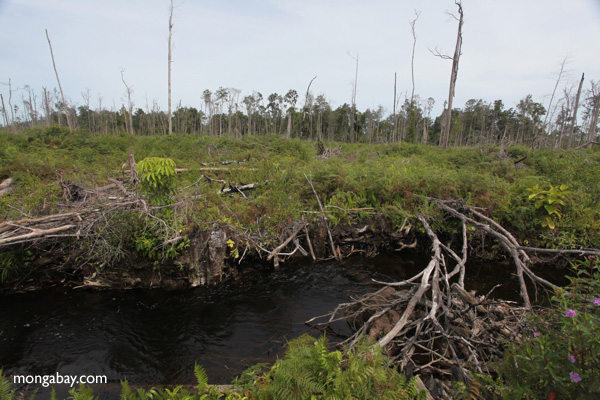‘Hidden’ source of emissions from peat swamp destruction identified

A canal draining peat forest in Indonesian Borneo
Degradation of peat swamps for oil palm and timber plantations is a substantially larger source of greenhouse gas emissions than previously believed, finds a new study published in the journal Nature.
An international team of researchers tested the water chemistry of channels draining peatlands in Malaysia and Indonesia. They found high levels of “ancient” carbon, indicating that peat swamp degradation releases carbon that has been locked away for thousands of years. Much of the carbon eventually makes its way into the atmosphere, contributing to climate change.
“We first noticed that the ditches draining areas converted to palm oil plantations were loaded with unusually high levels of dissolved carbon back in 1995, but it was not until my researcher Dr Tim Jones took samples to measure the age of that carbon that we realized we were onto something important,” said study co-author Chris Freeman of Bangor University.
“We were amazed to discover that the samples from Malaysian oil palm plantations contained the oldest soil-derived dissolved organic carbon ever recorded,” added Jones, also of Bangor University.

A canal draining peat forest in Indonesia’s Central Kalimantan. Photos by Rhett A. Butler
The authors estimate that accounting for carbon carried away by drainage canals adds 22 percent to the total carbon dioxide emissions from peatlands degradation, which was already known to be a major source of greenhouse gas emissions.
The results indicate that conversion of peatlands for plantations is even worse for climate than previously believed, according to the authors.
“Our results are yet another reminder that when we disturb intact peatswamps and convert them to industrial biofuel plantations, we risk adding to the very problem that we are trying to solve” said Freeman in a statement: “We have known for some time that in South East Asia, oil palm plantations were a major threat to biodiversity, including the habitat for orang-utans, and that the drainage could release huge amounts of carbon dioxide during the fires seen there in recent years. But this discovery of a ‘hidden’ new source of problems in the waters draining these peatlands is a reminder that these fragile ecosystems really are in need of conservation.”
Oil palm and pulp and paper plantation development increasingly occurs on peatlands, especially in Indonesia, where such areas often have fewer land claims and therefore easier to secure from local officials.
Emissions from peatlands are thought to account for more than half of Indonesia’s emissions from land use.
CITATION: Moore et al (2013). Deep instability of deforested tropical peatlands revealed by fluvial organic carbon fluxes. NATURE | VOL 493 doi:10.1038/nature11818
Related articles
Emissions from palm oil biodiesel highest of major biofuels, says EU
(01/30/2012) Greenhouse gas emissions from palm oil-based biodiesel are the highest among major biofuels when the effects of deforestation and peatlands degradation are considered, according to calculations by the European Commission. The emissions estimates, which haven’t been officially released, have important implications for the biofuels industry in Europe.
Carbon debt for some biofuels lasts centuries
(11/30/2011) It has long been known that biofuels release greenhouse gas emissions through land conversion like deforestation. But an innovative new study by the Center for International Forestry Research (CIFOR) published in Ecology and Society has computed how long it would take popular biofuel crops to payoff the “carbon debt” of land conversion. While there is no easy answer—it depends on the type of land converted and the productivity of the crop—the study did find that in general soy had the shortest carbon debt, though still decades-long, while palm oil grown on peatland had the longest on average.
Palm oil biofuel from peatlands has big climate impact, finds study
(11/08/2011) Biofuels produced from oil palm plantations established on tropical peatlands are a substantial source of greenhouse gas emissions, reports a comprehensive new assessment conducted for the International Council on Clean Transportation (ICCT).
George Soros: save Indonesia’s peatlands, rainforests
(12/09/2010) Speaking at a high-level event on the sidelines of climate talks in Cancun, Mexico, financier and philanthropist George Soros made an impassioned call to protect Indonesia’s peatlands, the destruction and degradation of which are the largest source of carbon dioxide emissions across the Southeast Asian nation.
Plantations on peatlands are huge source of carbon emissions
(11/29/2010) Converting peatlands for wood-pulp and oil palm plantations generates nearly 1,500 tons of carbon dioxide per hectare, making these ostensibly “green” sources of paper, vegetable oil and biofuels important drivers of climate change, reports new research published by scientists at the Center for International Forestry Research (CIFOR).
Asia Pulp & Paper’s emissions from paper production 500 times higher than claimed
(11/04/2010) Asia Pulp & Paper is misrepresenting the greenhouse gas emissions generated through its paper production by several orders of magnitude claims a new analysis of its carbon footprint by the Rainforest Action Network (RAN) and the Japan Tropical Forest Action Network (JATAN).

(09/28/2010) Indonesia’s greenhouse gas emissions reached 2.1 billion tons of carbon dioxide in 2005, making it the world’s third largest emitter of greenhouse gases, but offering opportunities to substantially reduce emissions through forest conservation, reduced use of fire, protection of peatlands, and better forest management, reports a series of studies released earlier this month by the country’s National Climate Change Council (DNPI).